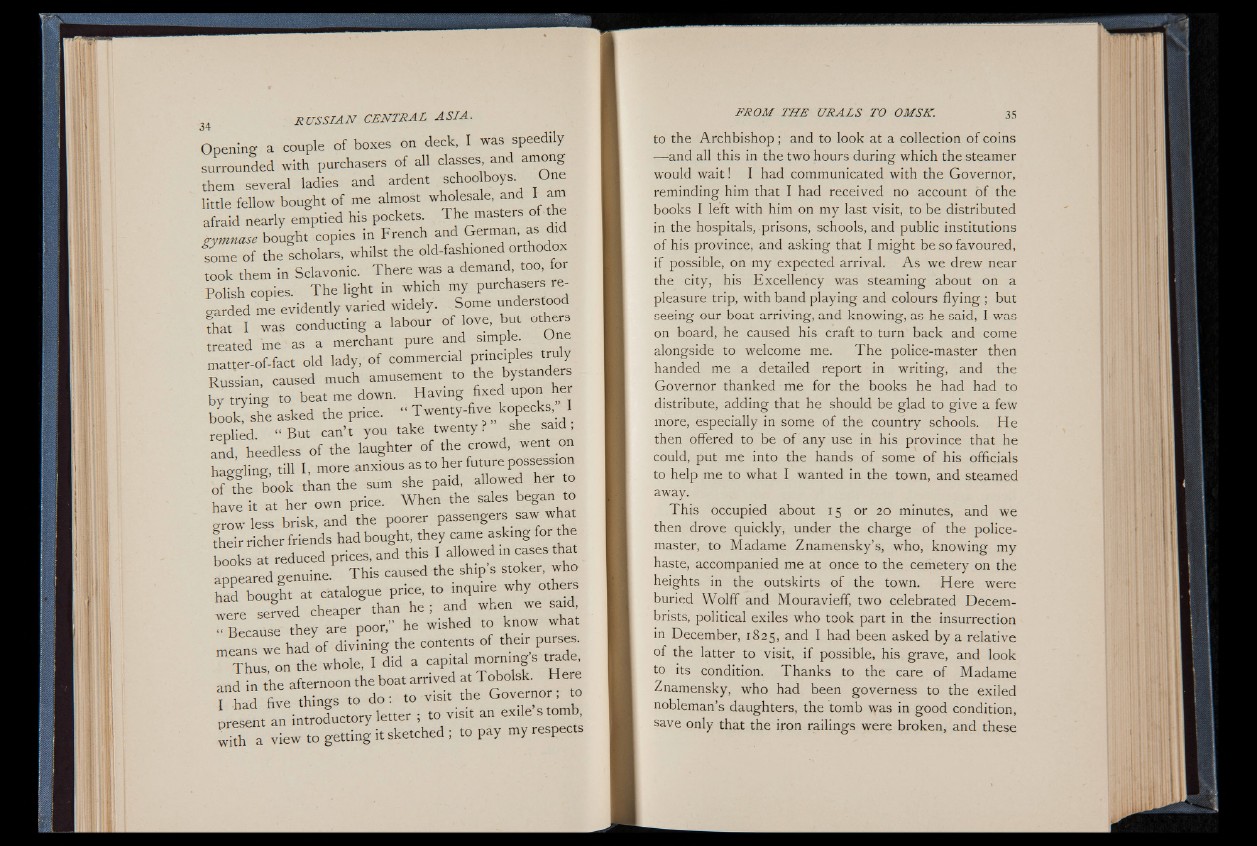
Opening a couple o f boxes on deck, I was speedily
surrounded with purchasers o f all classes and among
them several ladies and ardent schoo boys. One
little fellow bought of me almost wholesale, and t am
afraid nearly emptied his pockets T h e masters of-th
aymnase bought copies in French and German, as did
fom e o f the scholars, whilst the old-fashioned orthodox
took them in Sclavonic. T h e re was a demand, too, lor
Polish copies. T h e light in which my purchasers regarded
me evidently varied widely. Some understood
that I was conducting a labour o f love, but others
treated me as a merchant pure and simple One
matter-of-fact old lady, o f commercial p ™ a p l« t rd y
Russian, caused much amusement to the bystanders
by trying to beat me down. H a ving fixed upon her
book, she asked the price. “ Twenty-five kopecks I
replied “ But can’ t you take twenty? she said,
and, heedless o f the laughter o f the crowd, went on
h a z z lin z till I, more anxious as to her future possessio
o^ th e book ¿ a n the sum she paid allowed her to
have it at her own price. When the sales began to
grow less brisk, and the poorer passengers saw what
¿heir richer friends had bought, they came askmg for the
books at reduced prices, and th,s I allowed in cases that
appeared genuine. T h is caused the ship s stoker, who
had bought at catalogue price, to inquire why others
were sem td cheaper than h e ; and when we said
•' Because they are poor," he wished to know what
means we had o f divining the contents o f their purses.
Thus, on the whole, I did a capital mornings t r a f c
and in the afternoon the boat arrived at Tobolsk. Here
I had five things to do t to visit the G o v e rn o r ; to
present an introductory letter , to visit an exile s tomb,
S t a v i e w to getting it sketched; to pay my respects
to the Archbishop ; and to look at a collection of coins
— and all this in the two hours during which the steamer
would wa it! I had communicated with the Governor,
reminding him that I had received no account of the
books I left with him on my last visit, to be distributed
in the hospitals, prisons, schools, and public institutions
of his province, and asking that I might be so favoured,
if possible, on my expected arrival. A s we drew near
the city, his Excellency was steaming about on a
pleasure trip, with band playing and colours flying ; but
seeing our boat arriving, and knowing, as he said, I was
on board, he caused his craft to turn back and come
alongside to welcome me. The police-master then
handed me a detailed report in writing, and the
Governor thanked me for the books he had had to
distribute, adding that he should be glad to give a few
more, especially in some of the country schools. He
then offered to be of any use in his province that he
could, put me into the hands of some of his officials
to help me to what I wanted in the town, and steamed
away.
This occupied about 1 5 or 20 minutes, and we
then drove quickly, under the charge of the police-
master, to Madame Znamensky’s, who, knowing my
haste, accompanied me at once to the cemetery on the
heights in the outskirts of the town. Here were
buried Wolff and Mouravieff, two celebrated Decembrists,
political exiles who took part in the insurrection
in December, 1825, and I had been asked by a relative
of the latter to visit, if possible, his grave, and look
to its condition. Thanks to the care of Madame
Znamensky, who had been governess to the exiled
nobleman’s daughters, the tomb was in good condition,
save only that the iron railings were broken, and these